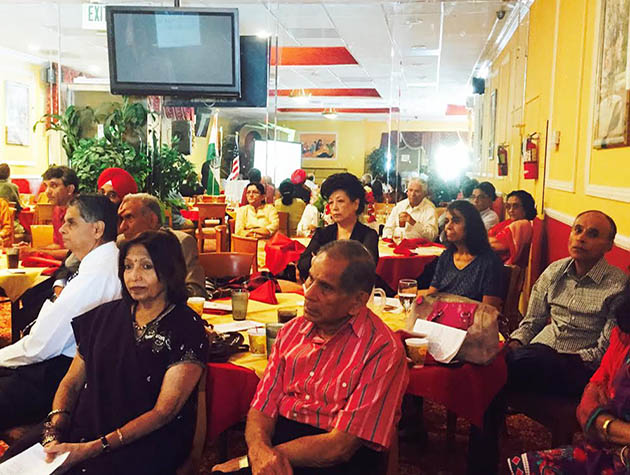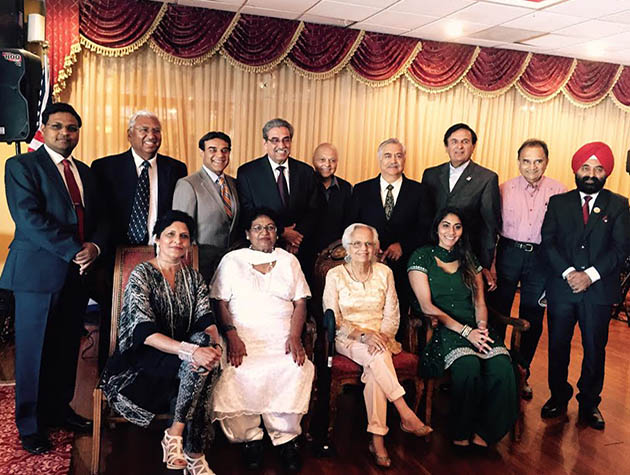
BY A STAFF REPORTER
ORANGE, CA — The Global Organization of People of Indian Origin (GOPIO) paid tribute to Indian pioneers and patriots who paved the way for freedom for future generations at the Tandoor Cuisine of India restaurant here on July 4. GOPIO-International chairman Inder Singh coordinated the seminar, a joint effort of...
ORANGE, CA — The Global Organization of People of Indian Origin (GOPIO) paid tribute to Indian pioneers and patriots who paved the way for freedom for future generations at the Tandoor Cuisine of India restaurant here on July 4. GOPIO-International chairman Inder Singh coordinated the seminar, a joint effort of...
several oraganizations including GOPIO-LA, GOPIO-OC, the National Federation of Indian American Associations, the Rajput Association of America, and the Indian American Heritage Foundation. The seminar was not just to pay tribute to the pioneers and patriots but also to acquaint the public with the sacrifices they made and the hardships they had to overcome to earn their living.
Kewal Kanda, past president of GOPIO-LA and current treasurer of GOPIO-International, recounted how Indians began arriving in the US and Canada at the beginning of the 20th century.
Most of the first arrivals were Punjabi Sikhs who came in search of work and accepted lower wage jobs that local unionized white labor did not want. The workers were attacked and robbed of their hard earned money, jewelry, and other valuable property, he said. Ashok Madan, president NFIA, spoke about the “Hindustan Association of the Pacific Coast,” founded in Astoria, Oregon, on April 23, 1913, that later became the Gadar Party, which by then was formed to throw British colonialism out of India.
Dilip Butani, president GOPIO-OC, spoke about the struggle Indians faced in obtaining U.S. citizenship. In 1923, the U.S. Supreme Court ruled that while Indians are Caucasians, they were not “white” and were therefore ineligible for U.S. citizenship.
Through the lobbying efforts of J.J. Singh, Mubarak Ali Khan, Anup Singh, Haridas Muzumdar, Taraknath Das and Dilip Singh Saund, President Harry Truman on July 2, 1946, signed into law the Luce-Cellar bill that allowed Indians to obtain U.S. citizenship, he noted. Navin Gupta, president GOPIO-LA, pointed out how Indian Americans, after realizing their American dream, had been giving back to the community, not only in US but also in India.
Some of the biggest donors are Dr. Amar Bose (Bose shares), Dr. Prem Reddy ($40 million), Rajendra Vattikutti ($40 million), Monte Ahuja and his wife ($30 million), Gururaj Deshpande and his wife ($20 million), and Dr. Vikram Patel and his wife ($18.5 million), he said. Yash Singh, president of the Rajput Association of America, spoke about the sacrifices of Sohan Singh Bhakna, who was tried in the Lahore Conspiracy Case, was sentenced to life in prison in the Andaman and after his release continued to agitate for the rights of farmers. Singh also spoke about Kartar Singh Sarabha, who returned to India in September 1914 to mobilize Punjabis for revolution. Rissaldar Ganda Singh, a traitor, had him arrested and tried in Lahore. Hanged at the age of 19, he became Shaheed Kartar Singh Sarabha. Vasu Pawar, past president UFICA, spoke about Vishnu Ganesh Pingle, another Gadarite who was hanged in 1917, and Lala Hardyal, a former general secretary of the Gadar Party who escaped arrest by the British in India and in 1930 earned a doctorate degree from the University of London. Maqbool Qadri spoke about Maulana Barkatullah, the anti-British revolutionary who formed an Indian government in exile in Afghanistan in 1915 and became prime minister, with Raja Mahendra Prasad as president. He died in San Francisco on Sept. 20, 1927. The seminar concluded with a Q& A session and the vote of thanks by Aparna Hande. Lunch was provided by Tandoor Cuisine of India.
Kewal Kanda, past president of GOPIO-LA and current treasurer of GOPIO-International, recounted how Indians began arriving in the US and Canada at the beginning of the 20th century.
Most of the first arrivals were Punjabi Sikhs who came in search of work and accepted lower wage jobs that local unionized white labor did not want. The workers were attacked and robbed of their hard earned money, jewelry, and other valuable property, he said. Ashok Madan, president NFIA, spoke about the “Hindustan Association of the Pacific Coast,” founded in Astoria, Oregon, on April 23, 1913, that later became the Gadar Party, which by then was formed to throw British colonialism out of India.
Dilip Butani, president GOPIO-OC, spoke about the struggle Indians faced in obtaining U.S. citizenship. In 1923, the U.S. Supreme Court ruled that while Indians are Caucasians, they were not “white” and were therefore ineligible for U.S. citizenship.
Through the lobbying efforts of J.J. Singh, Mubarak Ali Khan, Anup Singh, Haridas Muzumdar, Taraknath Das and Dilip Singh Saund, President Harry Truman on July 2, 1946, signed into law the Luce-Cellar bill that allowed Indians to obtain U.S. citizenship, he noted. Navin Gupta, president GOPIO-LA, pointed out how Indian Americans, after realizing their American dream, had been giving back to the community, not only in US but also in India.
Some of the biggest donors are Dr. Amar Bose (Bose shares), Dr. Prem Reddy ($40 million), Rajendra Vattikutti ($40 million), Monte Ahuja and his wife ($30 million), Gururaj Deshpande and his wife ($20 million), and Dr. Vikram Patel and his wife ($18.5 million), he said. Yash Singh, president of the Rajput Association of America, spoke about the sacrifices of Sohan Singh Bhakna, who was tried in the Lahore Conspiracy Case, was sentenced to life in prison in the Andaman and after his release continued to agitate for the rights of farmers. Singh also spoke about Kartar Singh Sarabha, who returned to India in September 1914 to mobilize Punjabis for revolution. Rissaldar Ganda Singh, a traitor, had him arrested and tried in Lahore. Hanged at the age of 19, he became Shaheed Kartar Singh Sarabha. Vasu Pawar, past president UFICA, spoke about Vishnu Ganesh Pingle, another Gadarite who was hanged in 1917, and Lala Hardyal, a former general secretary of the Gadar Party who escaped arrest by the British in India and in 1930 earned a doctorate degree from the University of London. Maqbool Qadri spoke about Maulana Barkatullah, the anti-British revolutionary who formed an Indian government in exile in Afghanistan in 1915 and became prime minister, with Raja Mahendra Prasad as president. He died in San Francisco on Sept. 20, 1927. The seminar concluded with a Q& A session and the vote of thanks by Aparna Hande. Lunch was provided by Tandoor Cuisine of India.



 RSS Feed
RSS Feed
